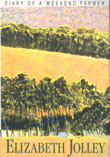
... By the end of the 1960s/1970s Jolley's career in writing was established and there followed more than two decades in which that regional career flourished as an inter/national one. ...

Courtesy Fremantle Press
An Inter/National Career
It was this conjunction of a new federal arts policy, a new rhetoric of
regionalism (related to a renewed nationalism), and new institutional
bases for writing and publishing that took Jolley from the position of
someone who writes-a faculty wife, a mother, a grandmother-to the position
of a professional writer. That this transition was complex personally
as well as institutionally is suggested by a story from her second short-story
collection, “The Performance.” It was, however, the early fruition
of her longstanding desire to have a career in writing. By the end of
the 1960s/1970s Jolley's career in writing was established and there
followed more than two decades in which that regional career flourished
as an inter/national one.
Across the 1980s Jolley remarkably published eleven books in ten years,
five of them in a two-year period from 1983 to 1984. In this decade she
became a Penguin Australia writer, and a recipient of numerous national
and two international literary awards, together with two Literature Board
Fellowships. She became a regular reviewer for national (sometimes international)
newspapers; an often-invited guest at inter/national writers' festivals
and academic conferences; an invited writer-in-residence at several universities
in Australia; a frequent subject of news reports and media interviews;
and the recipient of her first honorary doctorate and her several civil
honours, including being made an Officer of the Order of Australia for
services to Australian literature (1988). Finally, and not least as measures
of Jolley's inter/national career from the 1980s onwards, there were
still other developments: in 1989 her work first became the subject of
an academic dissertation, one of more than two dozen recorded here, six
from overseas universities and one including a Danish translation of Miss
Peabody's Inheritance; in 1987 Milk and Honey was the
first of eight of her novels to be translated into six different European
languages published in 24 different foreign-language editions; and in
1985 The New Yorker brought out one of her short stories, the first
of six it published. This last success (like being published by Penguin)
was one of her earliest ambitions.
Thus, after twenty years of the slow hard business of getting published
from a regional base, in the last half of her career Jolley was a central
figure in Australia's literary distributional and conversational
networks. The shape of the infrastructure that enabled Jolley's inter/national
career is illustrated by the record of events of one year from this period.
In 1997 the business of her writing life was marked by: teaching creative
writing at Curtin University over two semesters; publishing a novel, a
short story, four articles and two book reviews; participating in three
festivals (Melbourne, Perth, and Melbourne again); conducting writing
workshops in Perth and Canberra; appearing as guest speaker at nine events
in five capital cities; and taking part in promoting Lovesong—which
included an ABC television interview, six radio interviews, four print-media
interviews, two readings, and six guest-speaker appearances. Also in the
same year Jolley was awarded an honorary doctorate by the University of
Queensland (the third of four such degrees she received), and named one
of Australia's inaugural 100 Living National Treasures (and, in the
following year, a State Living Treasure).
The events of that one year reflect both the mature work of the last decades
of Jolley's writing life, and also the complex infrastructure of
a literary career in Australia at the end/turn of the century—and
they contrast to the infrastructure that shaped the first part of her
career in writing. There were several interrelated forces at play: a more
global and market-oriented publishing industry; a florescence of literary
festivals, competitions, prizes, awards and grants; an entrenchment of
government practices (however depleted the funding); an established place
for creative writing and Australian literature in universities; and an
electronically enabled media with tighter connections to the publishing
industry.
Her success within this milieu led one blogger to remark in the first
decade of the new millennium that “ten years ago you couldn't
move for Jolley,” and in Gangland (1997) Mark Davis included
her among those established writers who prevented younger writers from
thriving. Ironically, but not surprisingly, Davis' take on the literary-cultural
scene of the 1980s/1990s in the history of Australian letters echoes Jolley's
earlier, more muted expression of the difficulties of getting noticed
and published in the 1960s/1970s. Such a structural echo is perhaps a
recommendation for McKenzie Wark's notion, in his The Virtual
Republic: Australia's Culture Wars of the 1990s, that what is
needed in the national literary debate is a “zone of indifference”—a
place where different interests, purposes, styles and writings find expression
and an attentive hearing, a conversational zone that is inclusive. Such
a place, when set against the imperatives of the “slow hard business”
of writing, is necessarily an ideal, but it is an ideal that Jolley's
work, with it reiterated themes of the loneliness of being “on the
edge” of community, affirms.
*Note: This account of the contours of a writing life evident in the Bibliography
draws on: Barbara Milech, “Elizabeth Jolley”: The First Twenty
Years in Australia,” Australian Literature and the Public Sphere
(ed. Alison Bartlett, Robert Dixon and Christopher Lee, Toowoomba, Qld.:
ASAL-U of Queensland, 1999, 132-41).